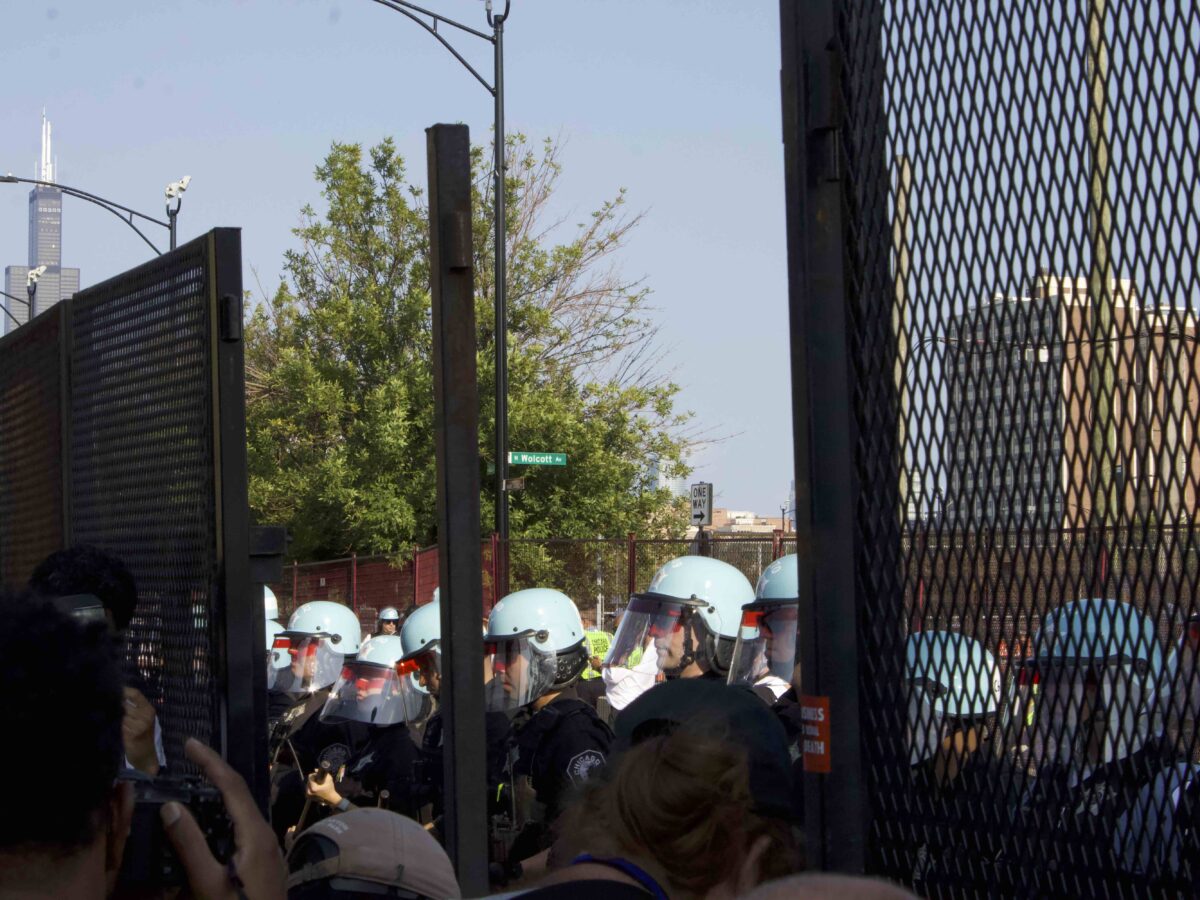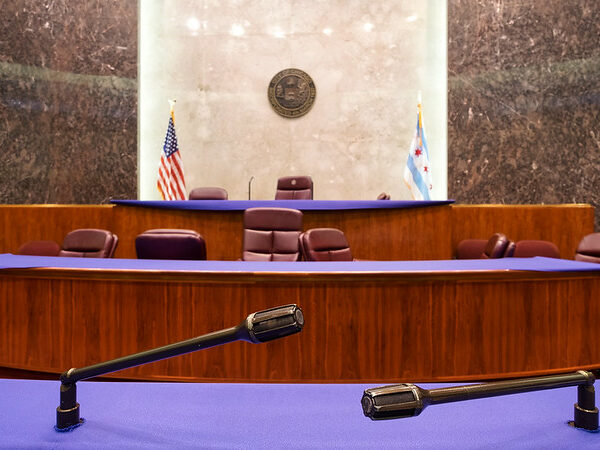This story was co-published with The TRiiBE.
On Monday, the City Council passed Mayor Brandon Johnson’s proposed 2025 budget in a 27–23 vote. It was the Johnson administration’s fourth budget proposal this season, which began with the mayor initially proposing a $300 million property tax increase, followed by a $150 million tax increase, and most recently, a $68.5 million property tax increase.
The $17.1 billion budget approved by alders does not increase property taxes or cut city services. However, it maintains investments in programs and services that reflect Johnson’s campaign promise to invest in people. For example, the number of youth summer jobs in 2025 will increase from 28,000 to 29,000.
“This is the largest number of city-funded youth jobs in the history of this city and a critical investment to ensure that our young people can start off on the right path,” Johnson told council members following the vote.
The 2025 budget also includes continued investments to address gender-based violence and funding for the Chicago Department of Public Health’s (CPDH) 911 alternative response, CARE (Crisis Assistance Response & Engagement) program.
To fill the budget gap, the mayor proposed additional fees and taxes, including a city parking-garage tax, bumping the grocery-bag fee from seven cents to ten, and generating $1.1 million from a streaming and cable TV tax. Johnson’s budget team also saved $40 million by spreading out payments toward the debts incurred by former Mayor Richard M. Daley.
The final budget does not include cuts to the more than 1,000 vacancies within the Chicago Police Department (CPD). A group of progressive alders and community organizers advocated reallocating money from those positions—which would save about $170 million—to fund youth jobs and public health initiatives. The city’s guaranteed basic income program, which began under former Mayor Lori Lightfoot, was also cut from the final version of the budget.
Positions within the Mayor’s Office will be cut, saving $1 million, and reductions to middle management positions in departments including CDPH, CPD, the Department of Human Resources, Department of Planning and Development, Department of Finance, Procurement services, the Commission on Public Safety and Accountability will save another $2.8 million, according to Ald. Jason Ervin (28th Ward), who chairs the Budget and Government Operations Committee.
“I know this is always a challenge. Today, I think voting ‘no’ is easy. You can say whatever it is that you want to say, but the investments that are presented to our communities, investments in the people that we represent, is what this budget is truly about,” Ervin said during Monday’s meeting.

During the weeks of political wrangling that preceded passage of the budget, council members faced pressure from constituents—and from special interest groups. Residents in some wards were targeted with political text messages sent by the pro-business PAC One Future Illinois that encouraged them to tell their alderperson to vote “no” on the budget.
Ald. Julia Ramirez (12th Ward), whose ward includes McKinley Park and Brighton Park, told The TRiiBE that residents of her ward received text messages from the One Future Illinois.
“We’re very familiar with tactics like these,” Ramirez said. She also referenced mailers circulated during the rollout of The Clean and Affordable Buildings Ordinance (CABO) earlier this year.
Ramirez voted in favor of the budget on Monday.
“It’s so much pressure. We were under very different circumstances last year,” she said. “Also, the need had changed so drastically since we had first started, so making sure that we meet that need, that we build out the social services that we believe in, but also not regressing, and like putting it on the backs of people that have been hurt for far too long.”
Now that the budget has passed, Ramirez sees next year as an opportunity for council members to be more creative in crafting future budget proposals.
At a press conference after the council meeting, Johnson said there was not much more to say to the groups behind the text messages.
“The small group of people who are committed to these austere budgets that have continuously created gross disinvestment over the course of decades,” Johnson said. “You have a mayor and members of the City Council, people within the labor movement who believe in working families in this city. We’re prepared and ready to stand shoulder to shoulder, to lock arms to ensure that we don’t have to guess whether or not our neighborhood schools are going to be fully funded, that we don’t have to guess whether or not we can afford groceries. That’s what’s at stake right here.”
Most of the 19-member Progressive Caucus voted to pass the budget, but that vote didn’t come without harsh criticisms of the Johnson administration.
“Mr. Mayor, we have heard a lot about your progressive values throughout this process, and I don’t doubt them, but how we do things is just as important as what we do,” Ald. Maria Hadden (49th) said during the meeting. “The way you’ve led this process has left the City Council fractured, Chicagoans less trusting in the government, and it’s left our city in an extremely vulnerable position as we enter the next year with the promise of attacks from the [Trump] presidential administration.”
Voting “yes” on the budget were alders Daniel La Spata (1st Ward), Lamont Robinson (4th), Desmon Yancy (5th), William Hall (6th), Julia Ramirez (12th), Jeylu Gutierrez (14th), Jeanette Taylor (20th), Michael Rodriguez (22nd), Byron Sigcho-Lopez (25th), Jessie Fuentes (26th), Ruth Cruz (30th), Rossana Rodriguez Sanchez (33rd), Carlos Ramirez-Rosa (35th), Angela Clay (46th), Leni Manaa-Hoppenworth (48th) and Hadden (49th).
Progressive Caucus alders Andre Vasquez (40th) and Matt Martin (47th) voted against the budget.

Vasquez echoed Hadden’s critiques, citing various reasons for his loss of confidence in Johnson’s administration. “The failure of this administration to advocate effectively for the state’s health and sustain and find sustainable revenue for our city budget and our schools instead of advocating for a publicly funded private stadium has left us without allies,” he said during the meeting.
Vasquez called for a “long-term sustainability over short-term fixes,” adding that Johnson’s administration is repeating the mistakes of previous administrations, and risking putting the city in a worse financial position in the years to come.
Monday’s City Council meeting lasted about four hours, with more than a dozen alders speaking in favor or opposing Johnson’s updated budget proposal. There was a thirteen-minute recess due to a staged demonstration that disrupted the meeting.
Those voting “no” today said they wanted to see more cuts to department budgets. Their full recommendations were included in a letter shared by Ald. Raymond Lopez (15th Ward) on X (formerly Twitter) on Dec. 15.
“We need to be honest with ourselves; we did not size this budget correctly,” Ald. Marty Quinn (13th Ward) said. “We haven’t made enough cuts. We made no necessary adjustments.”
Quinn is part of a group of more than a dozen alders that have been vocal about their opposition to Johnson’s budget proposals.
The group has also called for freezing spending on youth jobs and maintaining current spending on homelessness. They are also advocating for a new contract with SoundThinking (formerly known as ShotSpotter), creating a new 8th police district and a new 12th district satellite police district, and more.
“The 8th District is the largest and busiest district in the city and has not changed since the ’60s. Let me be clear: I know we are grappling with a challenging budget, and I realize it’s hard to ask for this project,” Quinn added. “We have so many financial obligations, but I believe we have reached the point of no return. We have an untenable situation on the southwest side, and the cost of doing nothing is much higher than finding a solution.”
During the meeting, Fuentes argued that council members’ opposition to it has less to do with fiscal concerns than their animus toward the mayor.
“I think that there are people who were oppositional because of their relationship and sort of perception of the mayor,” Fuentes said. Alders who proposed a last-minute bevy of cuts to the budget, she added, “were never going to vote for a [budget], right? We watched the goal posts move. First [it] was about property taxes, then it became about other things.””
Fuentes said that although she believes some of her colleagues would always oppose Johnson, others were genuinely concerned about residents in their ward.
“My bottom line was to ensure that we weren’t going to raise property taxes, that we had the significant protections in place to make sure that we protected our investments on treatment, not trauma, youth employment peacekeepers, and to make sure no one’s gonna get laid off from the city of Chicago,” she said.
Asked what he learned about this process and what he’d do differently as he approaches contentious votes in the future, Johnson said, “I learned here that you can walk in your principles and values even when people disagree, and you don’t have to be nasty about it.”
Multiple alders have described budget negotiations with the Mayor’s Office as acutely contentious. Johnson took a more serene view of the process.
“The big lesson here is that when we come together, even when it’s frustrating and when it’s even when it’s new, we can get through a process that speaks to the values of the people of Chicago,” he said. “So my confidence is just as high, my faith is strong, and now we’re ready to go to the next level here and work together to get the ultra-rich in this state to pay their fair share of taxes.”
Tonia Hill is a multimedia reporter for The TRiiBE, a digital media platform that is reshaping the narrative of Black Chicago. Corli Jay is a Report for America corps member for The TRiiBE, covering community investment in Chicago.




